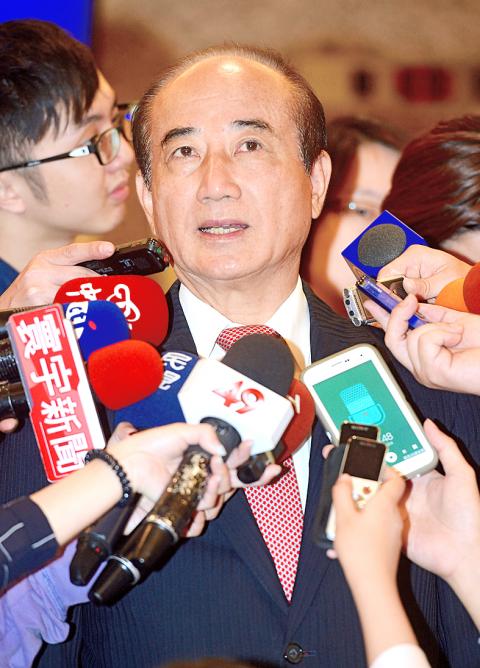The Chinese Nationalist Party’s (KMT) Central Standing Committee yesterday passed a motion to lift a self-imposed term limit on legislator-at-large seats for legislative speakers, opening the door for Legislative Speaker Wang Jin-pyng’s (王金平) potential re-election for a fourth term.
The proposal, jointly submitted by five committee members, was passed with the signatures of 29 of the 39 members, without being put to a vote at a routine meeting of the committee in Taipei.
The motion recommends an amendment be made to Article 2 of the KMT’s regulations on nominations for legislators-at-large and overseas legislators, which stipulates that KMT legislators-at-large are generally allowed to serve one term, but those with special contributions to the party are eligible for re-election.

Photo: Lo Pei-der, Taipei Times
The last paragraph of the article — dubbed the “legislative speaker clause” — states that KMT members who meet the above criteria and also serve as legislative speakers are entitled to a third term as a legislator-at-large.
The “legislative speaker clause” was added to the regulations in October 2011, before the end of Wang’s second term as legislator-at-large, for the apparent sole purpose of allowing him to retain his role for a third consecutive term.
Wang first assumed the speakership in 1999.
Under the new amendment, KMT legislative speakers who fulfil requirements would be exempted from the three-term limit.
“The legislative speakership is held by a legislators-at-large whose power and influence are accorded by their party. As such, their neutrality and authority might be compromised and questioned if their party can strip them of their position at will … or block their re-election bid by imposing a term limit,” the motion stated.
“In an effort to let the party’s legislative speaker fulfil duties without distractions, we propose that the committee make an amendment to the nomination regulations for legislators-at-large,” it added.
KMT spokesperson Lin Yi-hua (林奕華) said the committee did not discuss any specific KMT member or the party’s potential legislator-at-large candidates for the Jan. 16 elections at the meeting.
Prior to the meeting, KMT presidential candidate Eric Chu (朱立倫) said ensuring neutrality in the speakership was one of the three legislative reforms he plans to push for, if he wins the presidential race.
“The other two planned reforms include improving the efficiency of the legislature and improving transparency in legislative negotiations,” Chu said.
None of the three reforms would be affected because of a single individual, Chu said.
“My objective is to establish a long-term system. Any KMT members who disapprove of, or refuse to accept, these pending changes will not be nominated by the party as its candidates,” he added.
Wang said on the sidelines of an event in Taipei that the passage of the motion indicated support from leaders of both the KMT and the Democratic Progressive Party for a neutral legislative speaker and a reformed legislature.
“The public also looks forward to seeing these plans become a reality,” Wang said.

Intelligence agents have recorded 510,000 instances of “controversial information” being spread online by the Chinese Communist Party (CCP) so far this year, the National Security Bureau (NSB) said in a report yesterday, as it warned of artificial intelligence (AI) being employed to generate destabilizing misinformation. The bureau submitted a written report to the Legislative Yuan in preparation for National Security Bureau Director-General Tsai Ming-yen’s (蔡明彥) appearance before the Foreign Affairs and National Defense Committee today. The CCP has been using cognitive warfare to divide Taiwanese society by commenting on controversial issues such as Taiwan Semiconductor Manufacturing Co’s (TSMC, 台積電) investments in the

HELPING HAND: The steering committee of the National Stabilization Fund is expected to hold a meeting to discuss how and when to utilize the fund to help buffer the sell-off The TAIEX plunged 2,065.87 points, or 9.7 percent, to close at 19,232.35 yesterday, the highest single-day percentage loss on record, as investors braced for US President Donald Trump’s tariffs after an extended holiday weekend. Amid the pessimistic atmosphere, 945 listed companies led by large-cap stocks — including Taiwan Semiconductor Manufacturing Co (TSMC, 台積電), Hon Hai Precision Industry Co (鴻海精密) and Largan Precision Co (大立光) — fell by the daily maximum of 10 percent at the close, Taiwan Stock Exchange data showed. The number of listed companies ending limit-down set a new record, the exchange said. The TAIEX plunged by daily maxiumu in just

‘COMPREHENSIVE PLAN’: Lin Chia-lung said that the government was ready to talk about a variety of issues, including investment in and purchases from the US The National Stabilization Fund (NSF) yesterday announced that it would step in to staunch stock market losses for the ninth time in the nation’s history. An NSF board meeting, originally scheduled for Monday next week, was moved to yesterday after stocks plummeted in the wake of US President Donald Trump’s announcement of 32 percent tariffs on Taiwan on Wednesday last week. Board members voted to support the stock market with the NT$500 billion (US$15.15 billion) fund, with injections of funds to begin as soon as today. The NSF in 2000 injected NT$120 billion to stabilize stocks, the most ever. The lowest amount it

NEGOTIATIONS: Taiwan has good relations with Washington and the outlook for the negotiations looks promising, Minister of Economic Affairs J.W. Kuo said Taiwan’s GDP growth this year is expected to decrease by 0.43 to 1.61 percentage points due to the effects of US tariffs, National Development Council (NDC) Minister Paul Liu (劉鏡清) said at a meeting of the legislature’s Economics Committee in Taipei yesterday, citing a preliminary estimate by a private research institution. Taiwan’s economy would be significantly affected by the 32 percent “reciprocal” tariffs slapped by the US, which took effect yesterday, Liu said, adding that GDP growth could fall below 3 percent and potentially even dip below 2 percent to 1.53 percent this year. The council has commissioned another institution